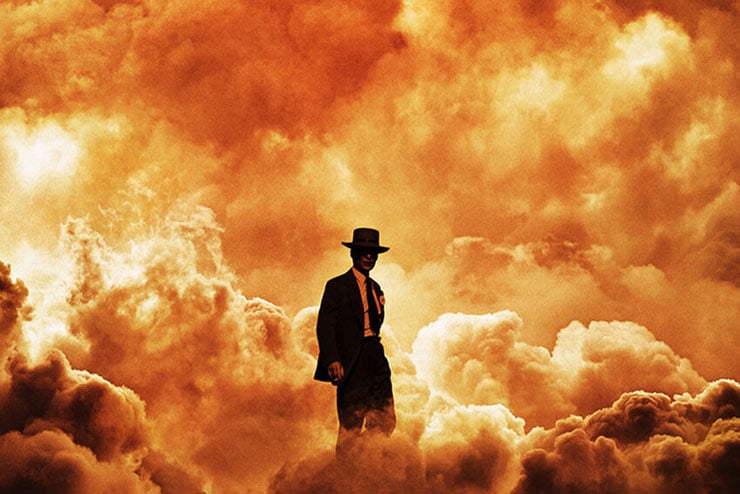This summer’s blockbuster Christopher Nolan film, Oppenheimer, is now available on the various video streaming services, just in time for the holiday interlude between Christmas and the new year. Having just read a puff piece about the film by New York Post movie critic, Johnny Oleksinski, I thought I was looking at the British Guardian or (for those old enough to remember) the Communist Daily Worker. Oleksinski couldn’t contain his praise for Nolan, who scripted this “masterpiece,” and his “remarkable treatment” of the movie’s “morally complex subject matter.”
The film’s protagonist Robert Oppenheimer was the scientist who headed the Manhattan Project, leading to the development of the atomic bomb. Nolan’s portrayal of this supposedly unfairly persecuted figure shows how the scriptwriter, who also scripted Batman, “can combine entertainment and smarts into a riveting whole,” according to Oleksinski. He also gives kudos to Robert Downey, Jr., for playing the “conniving politician” who indulges in red baiting by going after poor Oppenheimer.
When the New Left reconstructed America’s recent history in the 1960s, it portrayed American Communists and fellow travelers as well-intentioned, while those who went after them were raging bigots or just “conniving politicians.” As a result, even today American audiences are expected not to care that a socially privileged, well-educated scientist, who was asked to head the team that created the atomic bomb, described himself in the movie as a Communist sympathizer. Actually, this statement is meant to underscore Oppenheimer’s naïve and caring nature. Nor should we notice that his brother Frank, his mistress, and his wife were all Communists who, at least by implication, indirectly served Stalin’s mass-murdering regime.
Although the Soviet agent Klaus Fuchs was assigned to Hans Bethe, Oppenheimer’s associate in the Manhattan Project in 1943, Oppenheimer was supposed to oversee Fuchs, who regularly reported to his Soviet masters from 1942 to 1950. We also learn that Oppie expressed qualms about continuing American atomic research after the Soviets became our likely new enemies. But he seems to have been fine with the project as long as the “fascists” were being targeted.
Yes, I know that contrary to what this movie suggests, Oppenheimer eventually came around to working on the hydrogen bomb but even then, he continued to say nutty things that alarmed fellow scientists such as Edward Teller, who didn’t share Oppenheimer’s far-left politics. One needn’t disregard entirely Teller’s falling out with Oppenheimer to recognize at least a kernel of truth in his judgment that Oppenheimer, while loyal to the United States, was not the best person to be advising the Atomic Energy Commission (AEC). Perhaps the AEC should not have revoked Oppie’s security clearance in 1954, but if I had been sitting on that committee, I might have been tempted to vote with the majority. General Leslie Groves, who chose Oppenheimer for the Manhattan Project, understood the baggage his pick brought with him but, like Teller, he didn’t consider Oppenheimer to be personally disloyal to the United States. The question is whether anyone with his strongly pro-Communist views and close Communist associations should have been trusted with such a position.
Allow me, however, to engage in some counter-historical speculation. Let’s suppose that all those Communists and Communist fellow travelers whom Nolan presents in his script were Nazi rather than Communist zealots. Would Nolan have depicted these partisans of a politically incorrect totalitarian regime with the same tenderness that he lavishes on Oppenheimer’s Communist pals and his fanatical Communist lover? Of course, we know the answer from having watched Hollywood flicks since the 1940s portraying Communists as nice, educated people and all of their opponents as raging antidemocrats.
Moreover, the revocation of Oppenheimer’s security clearance is treated in the movie as a cosmic tragedy visited on a totally virtuous idealist by thoroughly evil people. Such details caused me to doubt Oleksinski’s judgment that Nolan addressed “morally complex subject matter” with admirable sensitivity. His presentation seems more like what Lilian Hellman and other Communist fellow travelers wrote about the Red Scare after our political culture turned decisively to the left in the 1960s.
It’s also hard not to notice that Wikipedia, History Today, Scientific American and other frequently consulted information sources have dismissed any attempt made in the 1950s to remove security dangers from the government as outburst of “McCarthyism” or the “Red Scare.” These gestures may be contrasted to the liberal establishment’s continuing war against fascism, which is always in fashion, and which deals with a danger that is allegedly still surging.
It seems that even the conservative establishment press has forgotten that Communist agents and spies were once a real threat to American security. Moreover, our enemies used supposedly idealistic leftists to ensconce themselves in high government positions. Sean McMeekin’s book Stalin’s War examines this problem in the context of showing exhaustively the effects of pro-Soviet advisors and agents on Soviet designs for Eastern Europe. One does not have to be an obsessive anti-Communist to recognize that more should have been done to address this problem. Those who are celebrating Nolan’s “masterpiece” obviously have a different historical understanding—or perhaps no understanding at all.

Leave a Reply